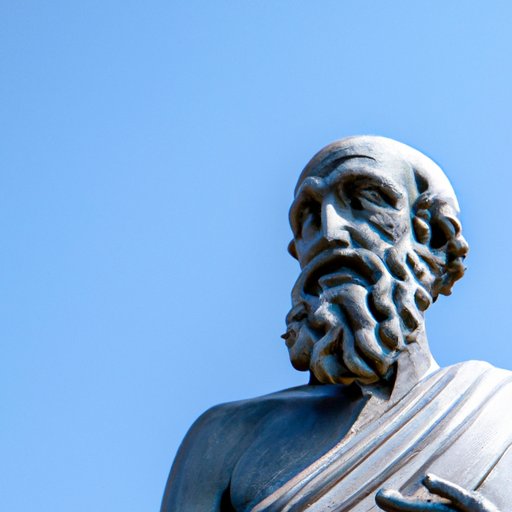
Introduction
When it comes to the origins of medicine, one name that often comes up is Hippocrates. Known as the “Father of Medicine,” Hippocrates is a name that is synonymous with medical knowledge and expertise. However, with so many different candidates vying for the title of “Father of Medicine,” it can be difficult to separate fact from fiction. In this article, we will provide a comprehensive profile on Hippocrates and his contributions to the field of medicine.
Discovering the Roots of Modern Medicine: A Profile on the Father of Medicine
The term “Father of Medicine” generally refers to the founder of modern Western medicine, a title that has been given to several individuals throughout history. The ancient Greeks are often credited with laying the groundwork for modern medicine, with figures like Hippocrates leading the way.
Ancient Greece was a civilization that placed great emphasis on the human body and the importance of health. Medical practices during this time were based on a combination of observation, natural remedies, and religious beliefs. Doctors were viewed as healers rather than miracle workers, and treatments were designed to promote health and well-being rather than cure diseases outright.
The most popular candidate for the title of “Father of Medicine” is Hippocrates, an ancient Greek physician who is widely regarded as one of the most important figures in the history of Western medicine.
The Pioneering Work of Hippocrates: Understanding the Legacy of the Father of Medicine
Hippocrates was an ancient Greek physician who is best known for his medical teachings and his commitment to ethical medical practices. Born in 460 BCE on the island of Kos, Greece, Hippocrates was the son of a physician and learned medicine from his father.
Over the course of his life, Hippocrates developed a number of key medical theories and practices that continue to influence modern medicine today.
Perhaps Hippocrates’ most important contribution to medicine was his belief in the importance of observation and careful study. He believed that doctors should rely on their own observations of patients in order to diagnose and treat illnesses. He also promoted the idea of ethical medical practices, advocating for a standard of care that placed the needs of the patient above all else.

Uncovering the Life and Times of the Father of Medicine: A Historical Perspective
Hippocrates lived during a time of great change and progress in the development of medicine. Ancient Greece was home to many great thinkers and philosophers, who were committed to advancing knowledge and understanding in all areas.
Hippocrates’ work was greatly influenced by the Hippocratic Corpus, a collection of medical texts that were written by numerous authors over the course of several centuries. These texts set out to establish a standard of care for medical practitioners, laying out ethical guidelines and best practices for diagnosing and treating illnesses.
During Hippocrates’ lifetime, there were also a number of important developments in medical research and practice. One of the most significant was the development of the concept of disease as an entity that could be studied and treated separately from the patient. This idea paved the way for modern medical research and paved the way for the development of many important medical theories and practices.
A Journey Through Time: How the Father of Medicine Shaped Modern Medical Practice
Hippocrates’ teachings and practices continue to influence modern medicine today. Perhaps his most lasting contribution is the concept of patient-centered care, which prioritizes the needs and well-being of the patient above all else.
Other important contributions include his emphasis on careful observation, his commitment to ethical medical practices, and his work in establishing a standard of care for medical practitioners that emphasizes the importance of treating the patient as a whole.
Throughout history, many other medical practitioners have built on Hippocrates’ ideas and carried his legacy forward. Modern medicine is built on a foundation of knowledge and understanding that has developed over centuries, with medical practitioners drawing on the insights and theories of the past in order to diagnose and treat illnesses today.
Hippocrates and the Birth of Western Medicine: A Reflection on the Father of Medicine
Hippocrates is often credited with laying the groundwork for Western medicine, a practice that has since spread around the world. His work has had a profound impact on the study of medicine and has influenced countless medical practitioners throughout history.
In the centuries since Hippocrates’ death, Greek medical knowledge and practices have continued to spread throughout the world. The works of Hippocrates and other Greek medical thinkers have served as the foundation for medical knowledge and understanding, laying the groundwork for modern medical practices and techniques.
Examining the Contributions of the Father of Medicine: How Hippocrates Changed the World
Hippocrates’ contributions to medicine were many but to name a few, his emphasis on careful observation, his commitment to ethical medical practices, and his work in establishing a standard of care had a profound impact on medical knowledge and understanding, paving the way for the development of modern medical practices. Medical practitioners today continue to draw on the insights and theories of the past in order to diagnose and treat illnesses today.
The Forgotten Story of the Father of Medicine: Rediscovering the Works of Hippocrates
Despite the significant contributions that Hippocrates made to the field of medicine, his teachings and practices fell out of favor during the Middle Ages. However, in the centuries that followed, scholars and medical practitioners began to rediscover and appreciate the insights and theories of the ancient Greeks, including Hippocrates.
Today, the works of Hippocrates and other ancient Greek philosophers and thinkers continue to be studied and appreciated, with scholars and medical professionals alike drawing on their insights and theories in order to improve medical knowledge and understanding.
Conclusion
In conclusion, Hippocrates is widely regarded as the “Father of Medicine” for his pioneering work in laying the groundwork for modern Western medicine. His emphasis on patient-centered care, careful observation, and ethical medical practices continue to influence medical practitioners and researchers today.
While there are many candidates vying for the title of “Father of Medicine,” it is clear that Hippocrates has left an indelible mark on the field of medicine that continues to be felt today.




